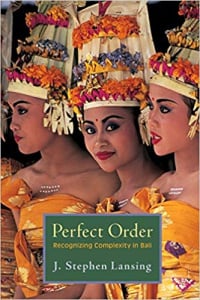Perfect Order: Recognizing Complexity in Bali
- Title
- Perfect Order: Recognizing Complexity in Bali
- Original language
- Author(s)
- Illustrator(s)
- Publisher
- Princeton University Press
- ISBN
- 978-0691027272
- Publication date
- Reprint edition (September 16, 2012)
- Subjects
- subak
- Find Book
- Amazon
- Related Env. Initiatives
- Related Places
- Related Biographies
- Related Children's Books
- Related Holidays
- Related Folktales
- Related Comics
- Related Lontar
- Linked words
Description(s)
Along rivers in Bali, small groups of farmers meet regularly in water temples to manage their irrigation systems. They have done so for a thousand years. Over the centuries, water temple networks have expanded to manage the ecology of rice terraces at the scale of whole watersheds. Although each group focuses on its own problems, a global solution nonetheless emerges that optimizes irrigation flows for everyone. Did someone have to design Bali's water temple networks, or could they have emerged from a self-organizing process?
Perfect Order--a groundbreaking work at the nexus of conservation, complexity theory, and anthropology--describes a series of fieldwork projects triggered by this question, ranging from the archaeology of the water temples to their ecological functions and their place in Balinese cosmology. Stephen Lansing shows that the temple networks are fragile, vulnerable to the cross-currents produced by competition among male descent groups. But the feminine rites of water temples mirror the farmers' awareness that when they act in unison, small miracles of order occur regularly, as the jewel-like perfection of the rice terraces produces general prosperity. Much of this is barely visible from within the horizons of Western social theory.
The fruit of a decade of multidisciplinary research, this absorbing book shows that even as researchers probe the foundations of cooperation in the water temple networks, the very existence of the traditional farming techniques they represent is threatened by large-scale development projects.







Enable comment auto-refresher